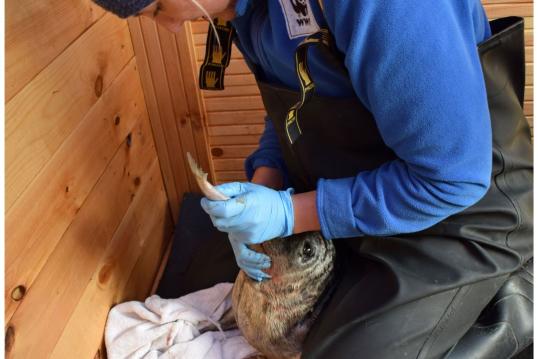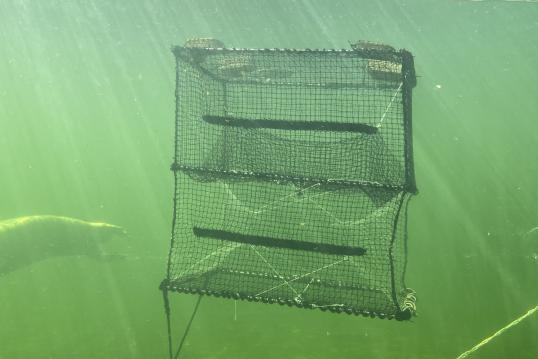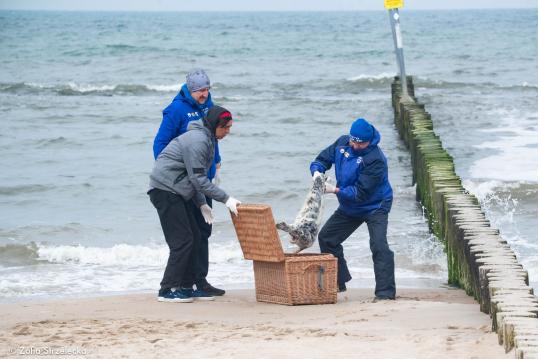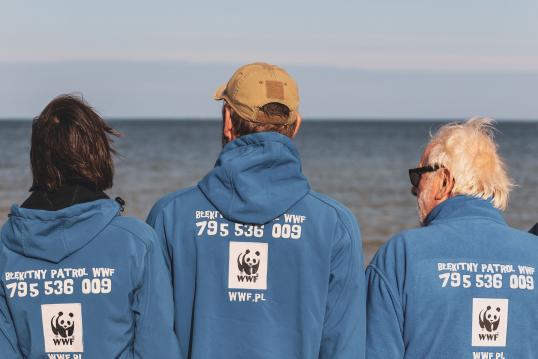
About the finalist
| Lead applicant | WWF Poland |
| Category | Marine conservation |
| Countries involved | Poland |
Main Natura 2000 site |
Numerous Natura 2000 sites in Poland including Ostoja w Ujściu Wisły and Zatoka Pucka i Półwysep Helski |
| Website | https://chronbaltyk.pl/ |
Overview
The impact of human activities on the coastline of Poland is increasing every year. This is leading to a visible decline in the populations of many seabirds, caused by visitor pressure during the breeding and nesting periods, and an increase in the stranding of seals, often injured by fishing gear, and potentially requiring the intervention of specialists in recovery centres.
In cooperation with Gdańsk University Hel Marine Station and Waterbird Research Group Kuling, WWF Poland has created the “WWF Blue Patrol”, a network of 200 volunteers who have been actively involved in a series of conservation initiatives targeting marine mammals (grey seal, ringed seal, harbour seal and harbour porpoise) and coastal birds (ringed plover, little tern, sandwich tern, common tern and oystercatcher). The patrol covers the entire 500-kilometre Baltic coast in Poland, including 23 Natura 2000 sites (seven sites protected for bird species and 16 sites protected for habitats and species other than birds).
Using their own funds, as well as financing from the EU Cohesion Fund and the European Regional Development Fund (ERDF), the conservation initiatives carried out by the partnership have included:
-
The rehabilitation of injured or ill stranded seals.
-
Testing alternative fishing gear to reduce interactions between marine mammals with fisheries, which is particularly important for the critically endangered population of the harbour porpoise (Phocoena phocoena) in the Baltic Sea.
-
The collection of scientific data on marine mammals and seabirds, their habitats and the pressures they face.
-
Monitoring of seal migratory routes.
-
Raising public awareness about the need to protect marine biodiversity, and advising them on how to behave when sharing the beach with wild fauna.
The WWF Blue Patrol has implemented over 2,600 interventions and – together with Gdańsk University Hel Marine Station and Waterbird Research Group Kuling – contributed to the rehabilitation of more than 250 injured or sick seals (the majority of which were released back to the environment), and the installation of more than 190 protective baskets to protect ringed-plover nests over more than 400 hectares of this species’ habitat.
This is the first time a volunteer network has been organised on the Polish coast of the Baltic Sea. WWF Poland has taken action to ensure the continuity of these interventions, using its own funds, and is actively seeking further funding. Furthermore, to promote the replication of this successful initiative elsewhere, WWF Poland has prepared a “Blue Guide”, disseminated their approach and achievements in meetings and conferences, and shared experiences with marine animal rehabilitation centres in the Netherlands.
Pictures from the finalist
Video from the finalist:
Details
- Publication date
- 14 March 2024
- Author
- Directorate-General for Environment






